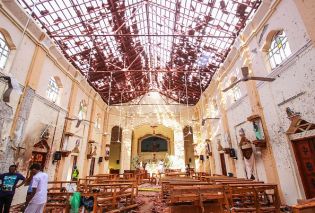
(CNSNews.com) – Sri Lanka’s government has blamed a little-known local Islamist group for the Easter Sunday bombings, but officials and security experts suspect global jihadists were connected to the deadly attack.
“There must be a wider international network behind it,” cabinet spokesman Rajitha Senaratne told reporters of the coordinated suicide bombings on churches and hotels in which 290 people were killed and at least 500 more injured.
The group being blamed for the attacks, named as National Thowheeth Jama’ath, was previously linked to the defacing of Buddhist statues, but not to terrorist attacks.
“We do not believe these attacks were carried out by a group of people who were confined to this country,” said Senaratne. “There was an international network without which these attacks could not have succeeded.”
A leading regional expert on terrorism said that, given the nature and scale of the bombings, the likeliest source was ISIS, or perhaps al-Qaeda. Neither terror network has formally claimed responsibility.
“The targets, the sophistication of the coordinated attacks, and the use of suicide bombers suggest this is likely to be the case,” said Ajai Sahni, executive director of the New Delhi-based Institute for Conflict Management (ICM) and its South Asia Terrorism Portal.
“There is also significant likelihood that the attacks have been planned, provisioned and mounted from abroad,” he said.
Sahni argued that, if the plot had been developed entirely in Sri Lanka, the scale of the conspiracy and the “extended logistics chain” it would have required would not have remained entirely hidden from the Sri Lankan intelligence services.
He also pointed out that the nature of the attack did not fit into the “domestic conflict dynamic” in Sri Lanka.
The Buddhist-majority Indian Ocean island nation emerged a decade ago from a bloody 26-year civil war between ethnic Sinhalese Buddhist governments and the mostly Hindu Tamil minority.
Where the Christian minority (about seven percent of the population) faces harassment or violence, the perpetrators have tended to be radical Buddhists, not Muslims (who account for less than ten percent of the population).
Converts to Christianity from Buddhist or Hindu backgrounds have faced most persecution, according to Sri Lankan and international religious freedom monitors. Muslims have also been targeted.
Sahni said some commentators have sought to link a climate of interreligious tensions to Sunday’s bombings, but from what is presently known that looks unlikely.
“If anything, an Islamist reaction to Sinhala Buddhist chauvinism would have targeted Buddhist or nationalist symbols, not Christian and purported ‘foreign’ targets (such as luxury hotels),” he said.
‘Significant and specialized training’
Sahni dismissed as “nonsense” the notion that the know-how to build the type of bombs used in the attack was “easily available on the Internet.”
“While very occasional successes are on record, most attempts to build bombs off information downloaded from the Internet end up in failure, or in people blowing themselves up during the process,” he said.
“Assembling a significant number of bombs, with the success rate witnessed in the April 21 attacks and the levels of lethality demonstrated, would require significant and specialized training, as well as access to the necessary materials. This implies the involvement of an experienced and well-coordinated network.”
There was no prior evidence that an Islamist terrorist network of that nature existed in Sri Lanka, he said.
The South Asia Terrorism Portal has on its records a conservative Islamist group in Sri Lanka called Thawheed Jamaath. Sahni said it “adheres to an exclusionary Islamist ideology, but has no known linkages to terrorism.”
He noted that the group has been involved in desecrating Buddhist sites and hate speech against other faiths.
But, he added, “I would be surprised if it had abruptly acquired the capacities and capabilities to execute such a series of attacks without setting off alarm bells across the intelligence and enforcement apparatus, both within the country and in the international [counter-terrorism] community.”
The U.S.-based SITE intelligence group noted that ISIS established its global network by recruiting from existing groups in target regions – such as al-Shabaab in Somalia, the Taliban in Afghanistan and Pakistan, and Boko Haram in West Africa.
Amid signs of a serious intelligence failure after authorities were warned by about a plot to bomb churches but failed to act or liaise across agencies, Sri Lankan officials were on Monday blaming each other, highlighting pre-existing tensions between the prime minister and president.
Hemasiri Fernando, the secretary of the ministry of defense, said that FBI officials have arrived to help investigators. Interpol is also deploying a team.
Of the 290 people killed, government officials say at least 39 were foreigners. They included four U.S. citizens or dual citizens, according to the State Department.
The department lifted its advisory for travel to Sri Lanka to level two (“exercise increased caution”), and warned that terror groups “continue plotting possible attacks” in the country.
It said terrorists could attack “with little or no warning,” and target locations including places of worship, hotels and restaurants, transportation hubs, and shopping areas.
Sri Lanka was previously at level one (“exercise normal precautions”) of the four levels used in department advisories. Level three is “reconsider travel,” and level four is “do not travel.”
The U.S. Embassy in Colombo will remain closed on Tuesday.
Source material can be found at this site.









